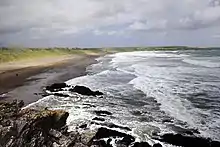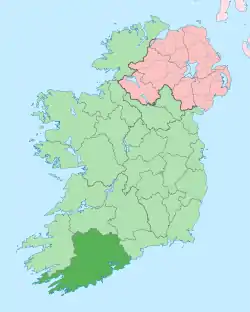Castlefreke
Castlefreke, also known as Rathbarry (Irish: Ráth an Bharraigh),[1] is a townland and village in County Cork, Ireland. The townland is located in the civil parish of Rathbarry on the R598 regional road, to the east of Rosscarbery.[2][3]
Castlefreke
Ráth an Bharraigh Rathbarry | |
|---|---|
Village | |
.jpg.webp) Rathbarry shop and post office | |
 Castlefreke Location in Ireland | |
| Coordinates: 51°34′21″N 8°57′49″W | |
| Country | Ireland |
| Province | Munster |
| County | County Cork |
| Time zone | UTC+0 (WET) |
| • Summer (DST) | UTC-1 (IST (WEST)) |
Name
The townland takes its common Irish language name (Ráth an Bharraigh or 'Rathbarry' meaning "fort of the Barrys") and its official English language name ('Castlefreke') from a large castle and estate in the area.[1] Built in the 15th century, this castle was originally associated with the Barry family and known as Rathbarry.[4] Acquired by the Freke family in the 17th century, the castle and its estate was renamed to become known as Castle Freke.[5]
The village is still commonly known as Rathbarry,[6] while the nearby townland, woods and dune system are commonly known as Castlefreke.[7][8]
Village
Rathbarry village has won several awards, including "Ireland's tidiest village" in the 1999 national Tidy Towns Competition and the overall "Ireland's best kept town" award in a 2017 all-island competition.[9][10]
To the south and west of Rathbarry village are a beach, Long Strand, and a Coillte managed woodland, Castlefreke Woods.[7][11] Behind Long Strand beach is a natural sedimentary lagoon, Kilkeran Lake, and a dunes system, Castlefreke Dunes.[7] The lake and dunes form a protected Special Area of Conservation.[8]
Castle
.jpg.webp)
The large castle and estate which dominates the area was originally the site of a 15th century tower house that was owned by the Barry family.[12]
The Freke family, who arrived in Ireland in the seventeenth century,[5] acquired a number of estates in West Cork, including the former Barry castle. In 1642, during the Eleven Years' War, the Freke family were forced to defend the castle from Confederate Irish forces during a sustained siege.[13][14]
Following an intermarriage with members of the Evans family, the combined Evans-Freke dynasty became Barons of Carbery in the early 18th century. The original 15th century tower house was damaged by fire and other events, and John Evans-Freke, 6th Baron Carbery built a new castle on the estate in 1780.[15][16] The older (Barry) fortification was incorporated into the estate's farm buildings.[13]

Following a fire in the early 20th century, Castle Freke was sold by John Evans-Freke, 10th Baron Carbery, and the estate and its lands passed to the Irish Land Commission.[17] The building was used as a military barracks during The Emergency (WWII) before being partially dismantled in the 1950s.[17] Remaining as a ruin for several decades,[5] the castle was purchased in 2005 by a descendant of the Evans-Freke family,[18] who (as of 2019) was restoring the building.[16]
The ruins of an early 19th century church and graveyard are located on the castle's demesne.[19][20]
See also
References
- "Ráth an Bharraigh / Castlefreke (see archival notes)". logainm.ie. Irish Placenames Commission. Retrieved 3 August 2020.
- "Castlefreke Townland, Co. Cork". townlands.ie. Retrieved 27 July 2020.
- "Relation: Castlefreke (5927338)". OpenStreetMap.org. Retrieved 27 July 2020.
- Lewis, Samuel (1837). Topographical Dictionary of Ireland. Lewis.
Rathbarry [..] which is situated on the southern coast, derives its name from an ancient fort, of which there are still some picturesque remains in Lord Carbery's demesne. This fortress, anciently called Rathbarry, now Castle Freke, was erected in the 15th century by Randal Oge Barry, and in 1602 was surrendered to Captain Harvey for Queen Elizabeth, according to the treaty of Kinsale
- "Estate - Freke". landedestates.nuigalway.ie. Landed Estates Database. Retrieved 3 August 2020.
Percy Freke of Rathbarry [Castle Freke], county Cork, purchased parts of various forfeited estates in the baronies of Muskerry, West Carbery and Ibane and Barryroe. The Freke family came to Ireland in the seventeenth century and acquired parts of the Barry estates
- "Rathbarry". filmincork.com. Retrieved 3 August 2020.
Rathbarry is a tiny but beautifully kept village [..which..] is also known as Castlefreke after the nearby Gothic Mansion and Estate
- "Castlefreke". coillte.ie. Coillte. Retrieved 3 August 2020.
- "Kilkeran Lake and Castlefreke Dunes SAC". npws.ie. National Parks & Wildlife Service. Retrieved 3 August 2020.
- "Celebration day at 'best kept' village". Southern Star. 25 August 2017. Retrieved 3 August 2020.
- "Celebrations today in Rathbarry, Cork; Ireland's Best Kept Town 2017". irishexaminer.com. Irish Examiner. 29 August 2017. Retrieved 3 August 2020.
- "Campaign group pleased with GoFundMe drive to safeguard West Cork woodland walk". irishexaminer.com. Irish Examiner. Retrieved 3 August 2020.
- "Castle Freke". landedestates.nuigalway.ie. Landed Estates Database. Retrieved 3 August 2020.
The existing building at Castlefreke was constructed at the end of the eighteenth century, replacing an earlier castle which had belonged to the Barry family, the original owners of the estate
- "1993:019 - 'Rathbarry Castle', Castlefreke, Cork". excavations.ie. Database of Irish Excavation Reports. Retrieved 3 August 2020.
- Gillman, Herbert Webb (1895). "Siege of Rathbarry Castle, 1642" (PDF). Journal of the Cork Historical and Archaeological Society. 2. I: 1–20.
- "Castle Freke". castles.nl. Retrieved 27 July 2020.
- "Labour of love to restore former family castle". Irish Examiner. 6 August 2019. Retrieved 27 July 2020.
- "Castle Freke, Castlefreke, County Cork". buildingsofireland.ie. National Inventory of Architectural Heritage. Retrieved 3 August 2020.
- "Castlefreke restoration runs into legal battle". irishexaminer.com. Irish Examiner. 21 August 2014. Retrieved 3 August 2020.
- "Rathbarry Church, Castlefreke, County Cork". buildingsofireland.ie. National Inventory of Architectural Heritage. Retrieved 3 August 2020.
- "Rathbarry Church". irishstones.org. 12 June 2016. Retrieved 3 August 2020.
